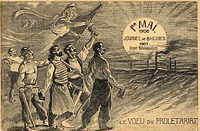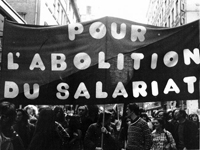What is going on in Poland arouses interest and emotion and, as was to be expected, has given rise to a whole literature. Le Monde has widely echoed this and has devoted many columns and even whole pages of its feature « Idées » to it.
All these articles embroider the same theme : the basic contradiction of a socialist State (i.e., a State where, by definition, the workers are in power) having to face workers’ revolts.
This contradiction is only apparent. It rests on a simple fetishism of words.
Is it in fact enough for a State to proclaim itself « socialist » or « communist » for the proletariat there to be victorious? Instead of replying in the affirmative and so stopping merely at the words, it is much more worthwhile to examine the structure of the socialist States to see what it’s really all about.
Let us first of all note that today the word « socialism” is served with all kinds of sauces. Did not Amin Dada himself say he was a socialist? Obviously nobody was found to repeat this. This comes from the common basis of all these sauces that socialism equals the all-powerfulness of the State, Where thing’s go wrong is when it is affirmed that the all-powerfulness of the State is the same as the all-powerfulness of the people.
If, on the other hand, the definition of the word « socialism » inherited from the 19th century is retained, i.e., the emancipation of the workers (a majority of whom are industrial), then the picture changes. It is better in any case to consider at the moment only the case of the USSR and its European satellites since to speak of the rule of the industrial proletariat in this or that African country where it is non-existent (or indeed in China where it is a tiny minority) is simply ridiculous.
In the USSR, and also in Poland, modern industry is sufficiently developed for the idea of socialism, in the sense recalled above, to have some sense. But what do we find?
In these countries the workers are employed in factories. They carry out work and receive a wage for this. They have no right to decide for themselves the direction or the aims of their work and they have hardly any means of influencing the level of their wages, in both cases no more and if anything less than their counterparts in the West. In other words, the workers supply their labour-power for which they are paid. Which is precisely the definition of the wages system if the writer who it is in good taste today to run down is to be believed : Marx. But, according to this same writer, who says wages system says capital. The one never goes without the other. In other words, the socialist States are, from the simple point of view of Marxian categories, in fact capitalist States.
But, it will be said, they are not capitalist states since capitalism is the private ownership of the means of production. This objection which is always being raised doesn’t stand up to examination since capitalism is, in an industrialised country, simply the fact that the means of production are not controlled by the real producers of the social wealth. The legal structure of the ownership of these means of production, important as it undoubtedly is for characterising a particular regime, is secondary from this point of view.
The State is not a pure abstraction. It has its officials of all grades. It is clear that, as in the big trusts in the West, it is the highest placed officials and their political representatives, in short those normally known as the bureaucracy, who in general decide everything concerning the economy and production in particular. They exercise power.
So what, it will be said, if this power is exercised for the benefit of the greatest number? Would that not then be socialism?
Everybody knows that in the USSR wage differentials are among the widest in the world, but it is also known that the advantages of those at the top are not confined to high salaries : there are also the benefits in kind of all sorts.
But these benefits, income, etc do not fall from heaven. They quite simply come from the labour of the basic producers, just as here. In other words all these top people appropriate surplus labour. They thus constitute the ruling and exploiting class, the equivalent of our bourgeoisie.
It may seem pointless to want to change the term « socialist State » into « State capitalism ». After all, words only have the meaning which it agreed to give them. The difficulties arise when it is sought to give them many opposing meanings. It can be decided that from tomorrow the colour blue shall be designated by the word « red » without changing anything else. It is certain that if this were done there would be some problems in describing a painting even if the term « real red » is used to designate . . . blue, just as « real socialism » is used to designate the USSR and its system of exploitation of man by man.
However there are many reasons which prevent everybody returning to a more precise vocabulary. I will mention three:
(l) The interest of the ruling class in the USSR and in Poland in maintaining the fiction of a socialist State presented as a paradise is quite clear. Their claim, even if cruder, is basically of the same kind as that of the Western ruling classes who affirm that the little man is in power through free elections to Parliament and of the President of the Republic.
,
(2) For many people, called Rightwing, in the West maintaining the fiction of socialist States in the East is useful to wave the bogey of a worsening of conditions at those who want to see changes in Western society. At the end of that road, as every one knows, is the Gulag.
(3) For many of those here who want to get rid of a society where, to speak like Giscard d’Estaing, equality and fraternity are not fully achieved, finding themselves without a « globally positive » model is insupportably traumatic.
But reality is stronger than this will to disguise things. What is happening in Poland, as has happened before on the other side of the Iron Curtain, far from being contradictory and incomprehensible is quite clear : it is the good old class struggle coming to the surface again. Here is the good old proletariat, to whom many are ready to say a precipitate good-bye, re-awakening and showing its teeth. It is possible, even probable, that certain of their demands, as for example free trade unions and a little more democracy, do not displease some members of the Polish or Soviet ruling class. After all they are no more homogeneous than those of the West.
The kind of ideas expressed above are far from being original or new. If I’m not in error, it is as long ago as 1919 that some people recognised in revolutionary Russia a State where the exploitation of man by man reigned. It is true that these people were leftists, as is said nowadays, and everyone knows that leftists are mad and incapable of having a coherent and sensible vision of anything. But as far as the particular case of Russia, etc is concerned, it seems that they saw the situation correctly before everybody else and that they continue to. Discussing who was first does not have much point and is, when it involves people’s misfortunes, somewhat inappropriate. There nevertheless remains a certain way of looking at things which departs from the usual rubbish. But have the media and the other big means of information any interest in making it known?
Daniel Saint-James
Le Monde, 2 December 1980




















































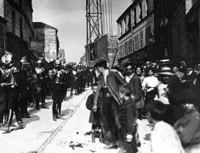




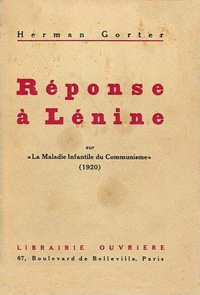


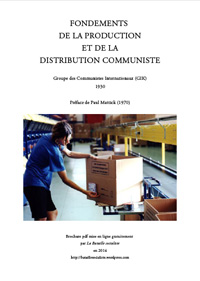




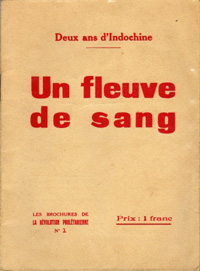


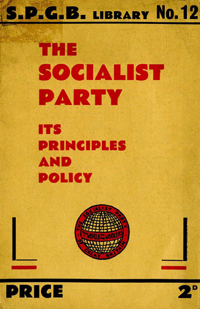
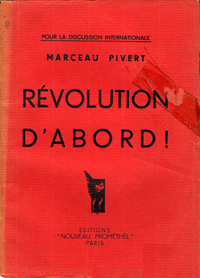





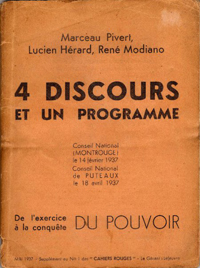



 Brochure sur l'assassinat d'A. Nin
Brochure sur l'assassinat d'A. Nin 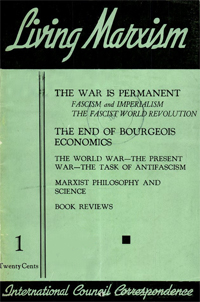
 Numéros de L'Insurgé de 1942 et 1943
Numéros de L'Insurgé de 1942 et 1943
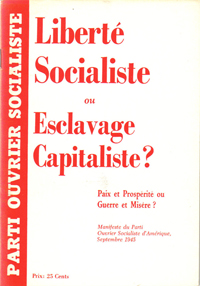

 Brochure Spartacus
Brochure Spartacus


 Mémorial de
Mémorial de 


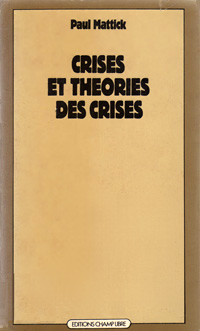


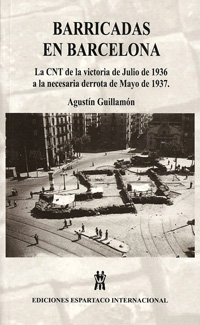

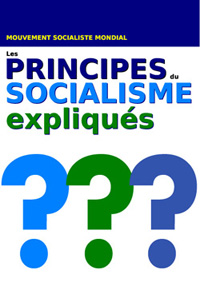
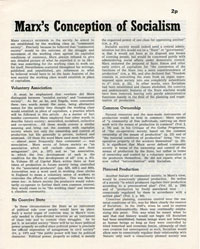













 page
page



